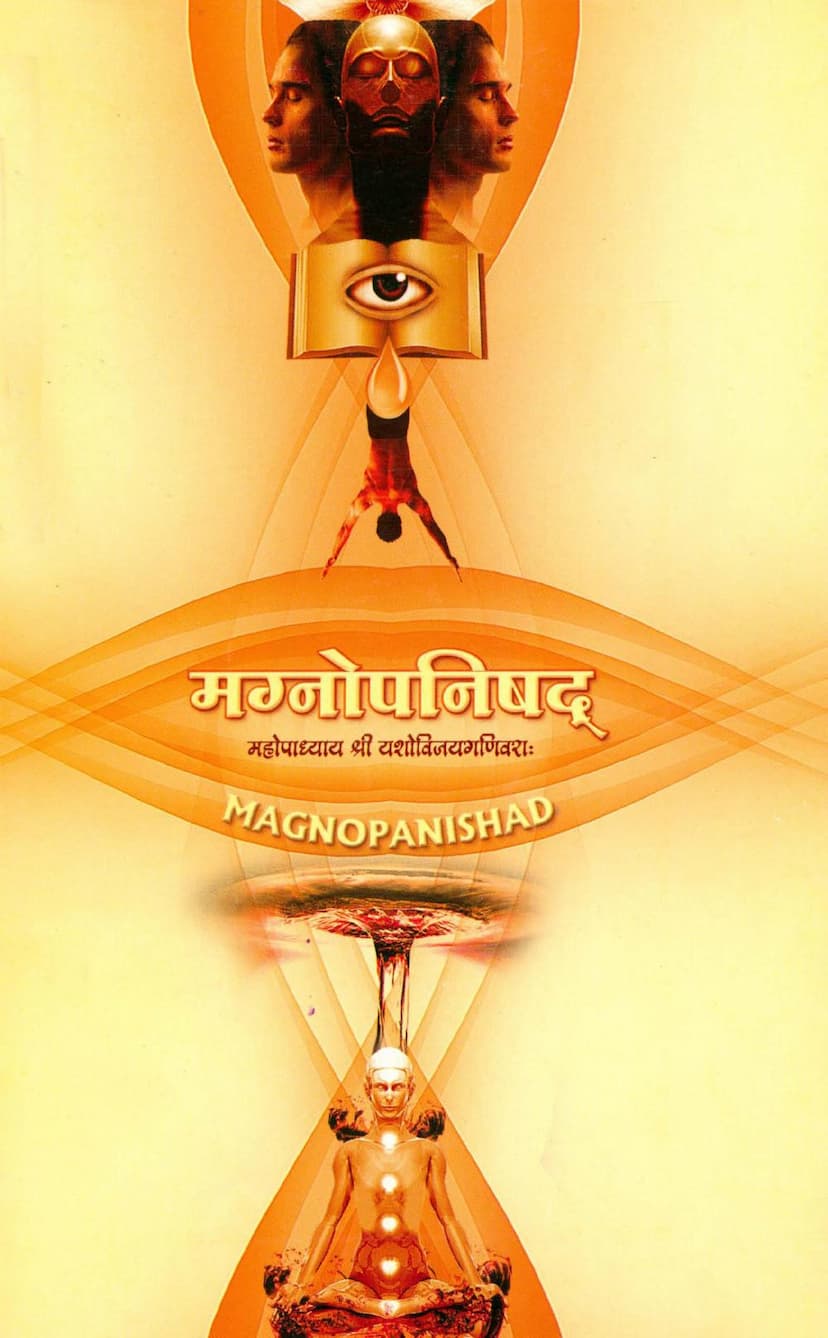Magnopnishad
Added to library: September 2, 2025

Summary
Here's a comprehensive summary of the Jain text "Magnopnishad," based on the provided pages:
Book Title: Magnopnishad (मग्नोपनिषद) Author: Mahopadhyaya Shri Yashovijay Gani (महोपाध्याय श्री यशोविजयगणिवर) Translator, Illustrator, Editor: Acharya Vijay Kalyanbodhisurishwar (आचार्य विजय कल्याणबोधिसूरीश्वराः) Publisher: Shri Jinshasan Aradhana Trust (श्री जिनशासन आराधना ट्रस्ट)
Overall Purpose and Theme:
The "Magnopnishad" is a presentation of the "Magnashtaka" (मग्नाष्टक), a composition within the larger work "Jnanasara" (ज्ञानसार) by Mahopadhyaya Shri Yashovijay Gani. The core theme of the text revolves around "Magnata" (मग्नता), which translates to self-immersion, absorption, or engrossment, specifically in the context of spiritual realization and attaining supreme bliss. The book emphasizes that true happiness and liberation (Jivanmukti) can only be achieved through deep immersion in one's own soul (Atman).
Key Concepts and Messages:
-
The Necessity of Self-Immersion: The introductory remarks (Page 6) powerfully state that no spiritual benefit can be derived without self-immersion. The only way to cross the ocean of worldly existence is to "drown" in the ocean of the soul. Whether termed supreme bliss, supreme happiness, supreme awareness, or supreme absorption, it is all found in this "drowning." Anyone who does not immerse themselves in the soul, regardless of their worldly achievements, has lived a futile life.
-
The Nature of the "Mग्न" (Engrossed Person): The text defines a "Mग्न" as someone who has withdrawn their senses from external worldly objects, stilled their mind in contemplation, and finds peace and rest solely in knowledge (Page 8-9). This person is deeply absorbed in the soul.
-
Knowledge as the Nectar of Immortality: The "Magnashtaka" consistently highlights the supreme importance of knowledge. It is described as an "ocean of nectar" and the "supreme divinity" (Page 10-11).
-
Detachment from Worldly Affairs: Those who are immersed in the bliss of the Supreme Brahman (Parabrahma) naturally become detached from mundane matters. They are no longer concerned with trivial material discussions, nor are they driven by the desire for wealth or the allure of sensual pleasures (Page 14-15). Their focus is entirely inward.
-
Witness Consciousness: A person immersed in the unequalled bliss of their true soul nature, who perceives the world in its true reality, does not act as a doer of external activities. They function solely as a witness (Page 12-13).
-
Growth of Inner Radiance and Bliss: The text references ancient scriptures like the Bhagavati Sutra, stating that as an ascetic's vows and practices (samyama-paryaya) increase, so does their "tejoleshya" (mystic radiance or inner heat) and their happiness. This is particularly true for those immersed in the Supreme Brahman (Page 16-17).
-
Incomparable Bliss of Knowledge: The happiness derived from being immersed in knowledge is described as beyond human description. It cannot be compared to the pleasure of embracing a loved one or the soothing sensation of sandalwood paste (Page 18-19). Even a single drop of this knowledge-nectar is immensely significant, reinforcing the coolness of equanimity. Complete immersion in this nectar is beyond any praise (Page 20-21).
-
Qualities of a True Yogi: The final verse (Page 22-23) offers salutations to the Yogi who is immersed in auspicious knowledge and meditation. Such a Yogi's very glance is like a shower of blessings, and their words are like streams of the nectar of equanimity.
Structure and Presentation:
The book is presented with the original Sanskrit verses (as found in the "Magnashtaka"), followed by Hindi and Gujarati translations. It is also adorned with illustrations that aim to convey the essence of the verses, making the profound spiritual concepts more accessible.
Overall Message:
"Magnopnishad" is a guide for achieving ultimate spiritual fulfillment. It posits that the path to liberation and supreme bliss lies in a profound and unwavering immersion in one's own soul and the realization of the Supreme Brahman through knowledge. It encourages readers to turn away from the transient pleasures of the external world and dive deep into the eternal ocean of the Self.